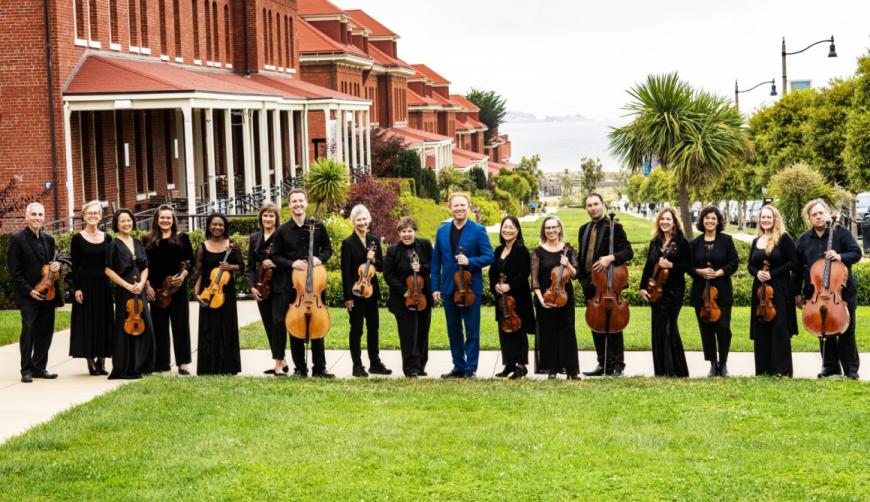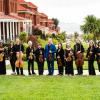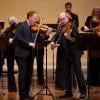
If programs must be themed, I’m glad New Century Chamber Orchestra chose “Points of Origin” for their Saturday concert at the Presidio Theatre: they were thus licensed to feature both new works by living luminaries (Nico Muhly and Jessie Montgomery) and, with just a little tilting of the head, early 20th-century English music.
Stranger, Muhly’s song cycle for tenor (Nicholas Phan) was lucid and concise in an earlier version for string quartet; now, it glints with greatness.
Muhly has expertly culled and treated the texts, a mix of letters, academic writings, and Bible verse. In the third song, propulsive plucking underscores each line of an immigrant’s argument against the Chinese Exclusion Act. Oscillating harmonics in the finale create the “splashings of the summer”; you can practically see the dappled sunshine.
Tenor Phan, always a commanding presence, brought especial tenderness to these songs, and the solos by Music Director and concertmaster Daniel Hope were wonderfully silvery.
Jessie Montgomery’s Banner starts off heavy-handed — augmented chords don’t subvert the national anthem that much — but once the theme goes to tatters, the piece finds its way. Lilting mariachi and joyful fiddle tunes interweave with silky melodies; then, the music turns inward. Before I can take in the moment, though, it zigzags away. With so many ideas, this music can’t help but be interesting; I just wish the parts I liked continued longer.
On the other hand, every bit of Britten’s Variations on a Theme of Frank Bridge is clever. Memorable among the miniatures (the boon of composers) are a barely upright march, a homely Viennese waltz, and a perpetual motion so stingy, the sections can only begrudgingly share. On Saturday, “Aria Italiana,” in particular, was a joy to watch: the first violins played in unforgiving unison while the rest of the orchestra strummed, by any means necessary, at breakneck speed.
Pathos does come. With its eerie, opaque drones, the hieratic Chant recalls ancient Greek tragedy. The finale is both dignified and uncertain, its idyll quivering as if charged with radiation left over from the Big Bang.
At least in the United States, Bridge is better known as Britten’s teacher than as a composer in his own right. If this refracted view is any indicator, his music deserves a second listen.
The 16th-century composer Thomas Tallis was once celebrated, but today, his music isn’t widely known aside from the theme featured in Vaughan Williams’s Fantasia. This simple psalm setting inspires a masterful piece: I’ve been listening to it for 20 years and still have more to discover.
At first, the theme is flat, like an organ that can only change volume by pulling out stops. Gradually, it grows full-bodied, as if time-traveling from the Renaissance through the Romantic era and into the beginnings of tonal ambiguity. In fact, the piece’s ending is hardly decisive: the cadence is weak, the memory of minor too fresh for the final major chord to triumph fully.
The variations endlessly spinning out, Vaughan Williams’s writing can grow ponderous (though not as much as the excerpt from John Williams’s film score Lincoln, beautifully played but musically below the grade of this group) in performance. On Saturday, though, the music had abandon. It helps that in Vaughan William’s intricate scoring, for solo quartet and two orchestras, each player enjoys a certain autonomy. Reductions exist, but they don’t really work: in New Century’s fine ensemble, especially, every musician matters.




